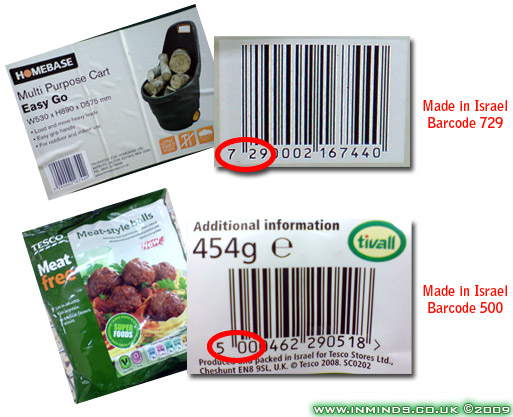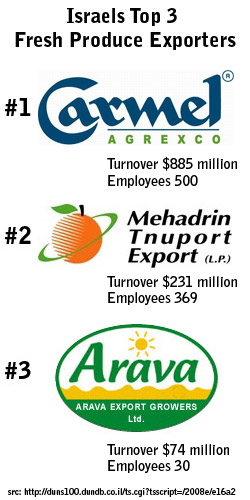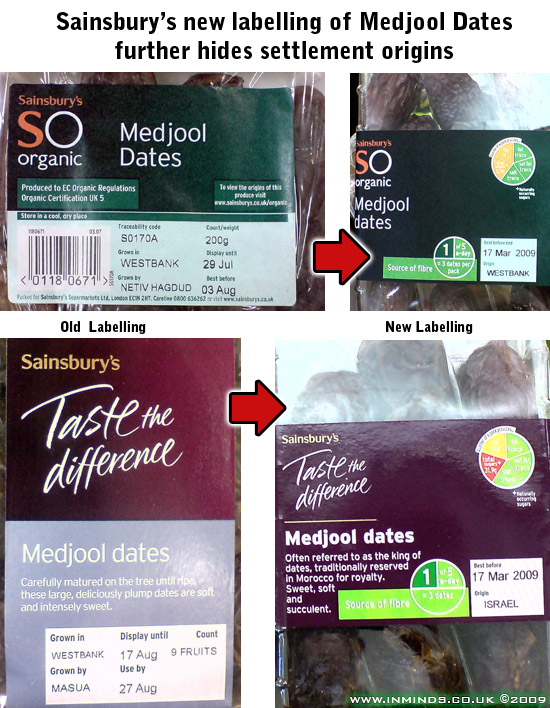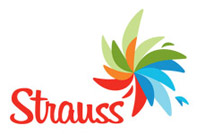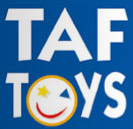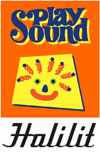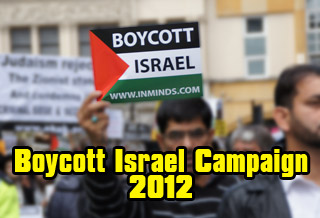SHOPPING CAN KILL!
CAMPAIGN
Most consumers do not realise the extent of the penetration of Israeli goods in to Europe, and in particular the UK market. The purpose of this campaign is to draw awarness to this and to encourage people to join the boycott by starting with boycotting 'made in Israel' products. We provide below a background of the current state of the boycott and research in to which Israeli goods are prevalent in UK stores. We follow this by suggesting strategies for implementing the campaign in your community.
1: BACKGROUND - BOYCOTT ISRAEL
Is the public ready to boycott?
A survey conducted for the Jewish Chronicle[20] in January 2009 found that 47% of British people support the Palestinian position compared to just 22% who support the Israeli line. Nearly 1 in 3 british people (29%) are in favour of boycotting israeli goods, and of those who aren't sure(30%) or feel its a bad idea(41%), most reason that sanctions would have no effect(48%) or worry that it would just harden the israeli position(14%). This survey clearly shows that British people empathise with the Palestinians and are willing to boycott Israeli goods but need encouragement and convincing that it will make a difference.
Does the boycott work?
Findings by the Israeli Union of Industrialists revealed that following the attack on Gaza, one in five Israeli exporters are having difficulty selling abroad due to the boycott. Yair Rotloi, chairman of the association's foreign-trade committee revealed "21 percent of local exporters report that they are facing problems in selling Israeli goods because of an anti-Israel boycott, mainly from the UK and Scandinavian countries". The Israel Export Institute reported in Feb 2009 that 10% of Israeli exporters were receiving order cancellations due to the boycott[35]. The boycott coupled with the economic climate has forced 66% of Israeli exporters to slash prices[21], and they have called for government intervention to protect them from a growing boycott[35]. In Feb 2009 Israels daily finance paper, the Marker, in an article titled "Now heads are lowered as we wait for the storm to blow over" reported that Israeli businessmen were in hiding, trying to "remain anonymous to avoid arousing the attention of pro-boycott groups"[35].
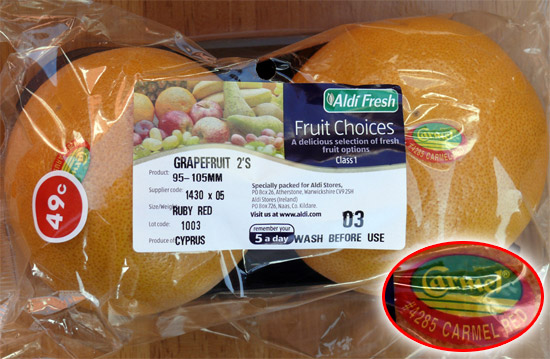 Aldi caught palming off Israeli Carmel grapefruit as produce of Cyprus
The situation is so bad that it has lead some exporters and retailers in Europe to falsify the country of origin on the packaging of Israeli goods. The Cyprus Mail newspaper reported on 19th March 2009: "A leading German supermarket yesterday admitted to effectively misleading European consumers by selling re-labelled Israeli Grapefruit as a product of Cyprus before passing it on to the public.. the decision to pass off the Israeli fruit by the German ALDI chain came after a widespread boycott of Israeli goods in the aftermath of the Israel’s invasion into Gaza in December. Since then, shoppers across Ireland especially, have been turning their backs on Israeli goods such as fruit, vegetables and electronics and it is thought that stockpiles of Israeli produce are rotting at supply depots."[22] Amid fears that this scam could lead to genuine Cypriot produce being boycotted, farming unions in Cyprus are furious and the Cypriot ambassador to Ireland, Sotos A. Liassides has referred the matter back to his government for vigorous action commenting that Aldi are "trying desperately to get rid of their (Israeli) stock by presenting it as Cypriot."[23] Environmental Health Officers from the Health Service Executive who are under contract to Food Safety Authority of Ireland have also become involved in the issue as it breaches EU regulations on food labelling.
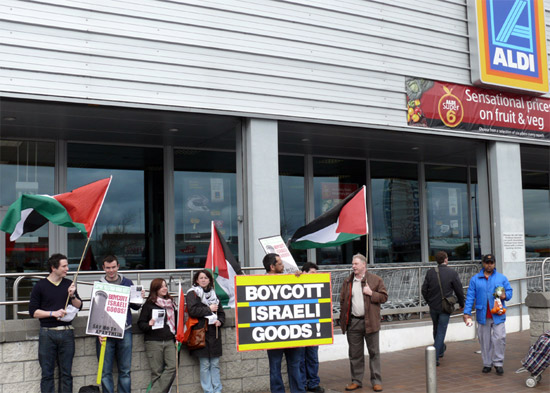 Protest outside Aldi in Galway, Ireland (14 March 2009) A few weeks later, in April 2009, another Irish supermarket chain, Dunnes Stores, was caught in a similar scam of palming off Israeli grapefruits to customers as Cypriot[24]. Seasoned campaigners will recall that Dunnes Stores was the site of a historic victory in the struggle against South African aparthied when on July 19, 1984 a 21 year old till worker, Mary Manning, courageously refused to handle two South African Outspan grapefruits which resulted in a bitter strike lasting nearly three years, before forcing the Irish governments hand to imposing a total ban on the importation of South African goods. Twenty years after the strike the city of Dublin honoured the strikers with a commemorative placue outside the store and today there is a street in Johannesburg named after Mary. Nelson Mandela recalled: "Young workers who refused to handle the fruits of apartheid 21 years ago in Dublin provided inspiration to millions of South Africans that ordinary people far away from the crucible of apartheid cared for our freedom"[25](see full story here[26]).
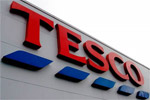
In the aftermath of the Gaza attack the UK supermarket Tesco set up a special customer helpline for those who are boycotting Israel. It gauged that the number of calls it was receiving from people complaining about its' selling of Israeli goods was jamming their general customer helpline. When customers rang Tesco's helpline they would now be greeted with the message "If you are ringing regarding Israeli goods, please press one." They would then be connected to specially-trained call centre staff. The extra cost to Tesco of having to setup a dedicated call centre because of the Israeli goods on its shelves was not lost on Jonathan Hoffman, co-vice chair of the Zionist Federation, he feared "The risk is that supermarkets will say it's too much of a problem to stock Israeli goods." After Tesco came under fire from the pro-Israel lobby who complained that Israel was being picked on as Tesco's had never before singled out a country, Tesco's finally relented and closed the boycott helpline on 6th April 2009[62].
 El Al advert after Hertz logo removed Non-Israeli companies who fear 'boycott by association' are taking action to distance themselves. In January 2009 El Al's website ran a promotion stating: "Now, more than ever is the time to come to Israel. Come express your solidarity with Israel. Fly with EL AL and receive 3 or 4 day car rental for free!". The advert had a clearly visible Hertz logo. Hertz were furious and demanded El Al immediately remove thier logo from the advert. Their spokesman stressed that Hertz had not been aware of the promotion being run by EL AL and did not want to be associated with it, further they "regret if any individuals were offended by the language that EL AL used to promote this offer".[36]
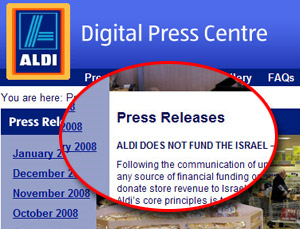 Aldi Press Release - We don't fund Israel
Another example of such pre-emptive action is that of Lidl and Aldi. During the attack on Gaza, chain SMS's and emails had circulated claiming that "Lidl and Aldi supermarkets declared publicly on TV from their HQ's in Germany that they will donate all their takings/ revenue to Israel during this war on Gaza." Normal company practice would have been to ignore such chain mail, but both companies fearing a mass consumer boycott immediately issued press realses that they do not fund Israel. The Adli press release read "Aldi confirms that it does not provide Israel with any source of financial funding or support the Israel – Gaza conflict. Aldi has never declared that it will donate store revenue to Israel during the conflict and any such claims are completely untrue."[63]
Companies joining the boycott
 FreedomCall refuses to do business with Israel Some companies are themselves taking the moral stand and boycotting Israel. On 30th December 2009, a British telecommunications firm FreedomCall terminated its cooperation with Israel's MobileMax. Richard Ramsey, the managing director of FreedomCall, sent an e-mail to the Israeli tech firm MobileMax. "As a result of the Israeli government action in the last few days we will no longer be in a position to consider doing business with yourself or any other Israeli company." MobileMax CEO Raanan Cohen was shocked by the boycott "We weren't expecting this from them and there was no prior warning.".[38][39]
In January 2009 Israeli news Ynet reported that a London based Pashmina company was refusing on-line orders from Israel, email correspondance revealed they had joined the boycott of Israel due to "horrors committed by the Israeli army."[37]
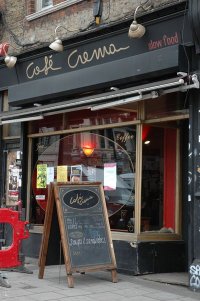 Cafe Crema: "we do not use any Israeli products"
In March 2009 a top London cafe, Cafe Crema in New Cross, put up a notice which reads "we do not use any Israeli products". Despite vilification in the Jewish media and wild accusations of anti-Semitism, its owner Chris Boddington was undeterred, "we will continue to boycott Israel, and we certainly won’t hide the fact.. it’s as legitimate as boycotting South Africa was in the 1980s.. Israel needs to think about why so much of the world is against it.."[34] The cafe also stocks genuine Palestinian products (from Zaytoun).
Palestinian goods
In contrast to Israeli goods, genuine Palestinian products, where available, are selling extremly well. An article in the Guardian newspaper (Feb 2009) titled "Palestinian olive oil bucks UK recession" revealed that as "an unintended consequence of Israel's offensive in Gaza, sales of Palestinian olive oil in Britain are soaring"[40]. Equal Exchange, a seller of Fairtrade products, reported a threefold increase in sales of Palestinian olive oil from the West Bank in January compared with a year ago. "We have run out of one-litre bottles and we expect sales to double to 400 tonnes this year compared to 2008," said Barry Murdoch, the sales director of Equal Exchange. The company Zaytoun, also established to sell Palestinian olive oil in the UK, reported a fourfold rise in sales last month instead of the usual post-Christmas lull. Nasser Abufarha, the chairman of the Palestinian Fairtrade Association revealed "we have a buyer in the Netherlands who has sold the whole container before the container arrived, they had enough orders from shops that were very excited, eagerly waiting for the product to arrive so certainly there is a lot of excitement about Palestinian products and a lot of interest in supporting Palestinian communities through the product". The Co-operative Group is the first supermarket to stock Palestinian Fairtrade olive oil (available in around 300 Co-op stores across the UK from 22 March 2009)[31].
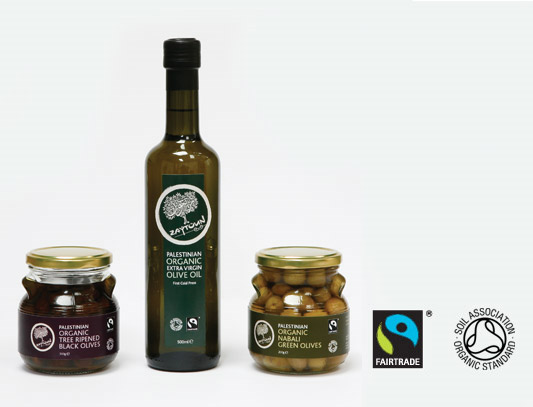 Zaytoun Palestinian Fairtrade Organic Olive Oil - fourfold rise in sales Targetting Settlement Companies
Whilst there can be no moral distiction between land stolen in 1948 and land stolen in 1967, between those ethnically cleansed in 1948 and those ethnically cleansed in 1967, between the massacres and crimes committed in 1948 and those that were committed later, yet from a campaigning perspective there is an important difference. Every country in the world recognises the 1967 occupation and the settlements built on that occupied land as illegal, since Olso this is no longer the case with land occupied in 1948. Because of this, companies operating in the israeli settlements make excellent targets for boycott campaigns. By setting up shop in the settlements the companies are in violation of international law, leaving them vunerable to pressure to divest their illegal holdings. Following this strategy has lead to some spectacular victories in recent months for the boycott movement:
AUG 2008:
In August 2008 Barkan Wineries moved its operation out from the illegal West Bank settlement of Barkan after its parent company Tempo joined the Dutch Heineken Group. Faced with calls of boycott and negative publicity Heineken relocated the winery. The company directors report explained to its stockholders: "In the past, the location of the company's winery at the Barkan area caused a negative image and made difficult the exporting of the Barkan brands. The company is acting to change this image.."[29]
OCT 2008:
The Swedish company Assa Abloy in October 2008 annouced it was closing its Mul-T-Lock locksmithing factory in Barkan in the West Bank following a daming expose by the Swedish NGO Diakonia which warned that the company may be subject to law suits over its violation of international law by operating on occupied land. Assa Abloy spokesman said: "We are very sorry that we did not notice it before, but we did not understand that we might be violating international law."[28]
NOV 2008:
Israeli water cooler company Eden Springs was forced to close its East Scotland depot after loosing 'hundreds of contract' across Scotland following a determined campaign by the Scottish PSC. Lost contracts include East Lothian and West Lothian Councils, Caledonian MacBrayne Ferrries, Heriot–Watt University, Stevenson College, Scottish Council of Voluntary Organisations, as well as a number of Scottish trade unions and student bodies having all voted to boycott Eden springs explicitly on the grounds of their violations of international and human rights law in the Golan Heights[30]. Its parent company in Israel sells mineral water which it extracts illegally from the Salukia spring in the Golan Heights and has a bottling plant in Katzrin, also in the Golan Heights. The Golan Heights is Syrian territory illegally occupied by Israel since June 1967.[31] Since the closure, Strathclyde University and Dundee University (Feb 2009) have also taken steps to boycott Eden Water.[32]
DEC 2008:
In 2001 Univeler through its take-over of American company Bestfoods it aquired a 51% stake in Beigel & Beigel Ltd which is located near the Ariel settlement on the West Bank. After sustained campaigning and bad publicity with retailers like Harrods clearing their shelves of Beigel & Beigel products (August 2008), Uniliver finally announced in December 2008 that it will sell its stake in Beigel & Beigel[27] - for the multi-national the negative publicity in keeping an illegal bakery of 140 workers just wasn't worth it.
JAN 2009:
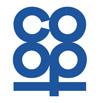
On 5th January 2009, th Co-operative Group chair Len Wardle announced : "The Co-operative Group board has decided to suspend sourcing products from illegal West Bank settlements. However, we will continue to trade with Israel and will seek to develop trading links with Palestinian farmers. The Co-operative Group only rarely curtails trade with particular countries or regions. However, in the case of the illegal settlement in the Israeli controlled occupied territories, it has proven to be all but impossible to ensure that supplies derived from the region are not perpetuating injustice and unfair terms of trade. We will no longer source dates, grapes and a number of herbs from the illegal West Bank settlements and will be phasing out the use of similar items from our own brand products."[43] This followed a sustained campaign of pickets and represetations from consumers demanding the Co-op live up to its ethics policy. Having achieved victory regarding the boycott of settlement goods campaigners are now lobbying the Co-op to boycott all Israeli goods. On 13th February they picketed a meeting of the Co-operative in Aberdeen, a representative from the meeting revealed that a motion on a full boycott had been put forward from the Scottish Co-op for discussion by the UK executive.[42]
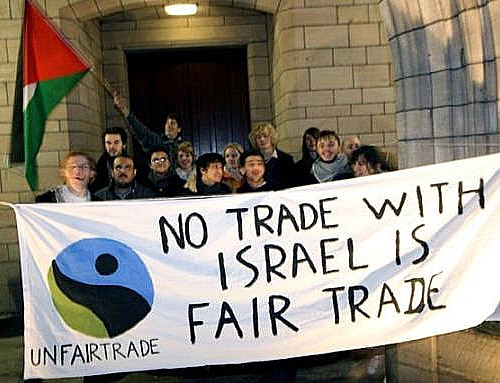 Students at the University of Aberdeen protest at the Elphinstone Hall, where members of The Food Co-operative were meeting, to pressure the food retailer to ban Israeli products from its stores (13 Feb 2009) MAR 2009:
Alstom and Veolia are partners in the CityPass consortium, contracted to build a light rail tramway system linking west Jerusalem to illegal Jewish settlements in occupied east Jerusalem therby directly helping Israeli annexation of the territory of east Jerusalem.[66]
In March 2009 the Swedish national pension fund AP7 excluded the French transportation giant Alstom from its portfolio due to Alstoms involvement in Israel’s occupation of Palestinian land[68]. This follows the 2006 decision by Dutch ASN Bank to exclude Veolia from its portfolios. At the time ASN Bank explained its decision: "Veolia's involvement does pose a problem for ASN Bank in applying the banks' social criteria on Human Rights. We believe that Veolia's involvement in the light rail project is not in line with the UN's demand to stop all support for Israel's settlement activities, and is therefore not in line with ASN Banks' social criteria.. we are of the opinion that Veolia's activities in Jerusalem are in conflict with UN Resolutions. Therefore, on this current information Veolia will be removed from our investment universe."[66]
APR 2009:
In April 2009 Veolia lost a local government contract in Bordeux worth 750 million Euro to manage France's biggest urban network[64], and in March 2009, Sandwell Metropolitan Borough Council expelled Veolia from the list of tenders for a waste management contract worth £1 billion over 20 years[65]. This followed a sustained campaign from activists across Europe exposing Veolias illegal activities in the settlements.
Legislation Margaret Thatcher put in place to protect apartheid era South Africa prohibits local authorities in the UK from taking in to account moral considerations like human rights violations when allocating contracts[67]. This means councils can not admit to being influenced by such considerations, so Sandwell Council announced their decision was purely a business one.
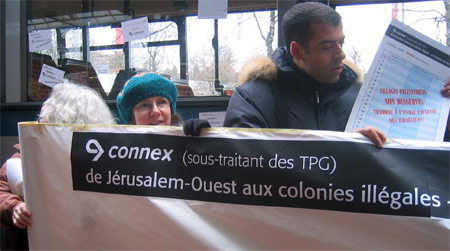 Protest against Connex (Veolia) in Genève
This follows a similar decision by Stockholm community council in January 2009 not to continue its contract with Veolia who had for the past 10 years been contracted to run Stockholm' Subway. The new contract for the next 8 years was worth 3.5 billion euro, the biggest in Europe[71]. Veolia’s involvement in the controversial Israeli tramway project has been intense in Swedish media with politicians demanding on prime time tv that Veolia should be excluded from bidding because of its involvement in the Israeli light rail project that illegally runs on Palestinian land[70].
In August 2006, Veolia were forced to cancel plans to train Israeli engineers and drivers on the Dublin Luas light railway after the Irish trade union SIPTU, representing the drivers on the Dublin tran system, refused to train them due to the illegality of the Israeli line.[69]
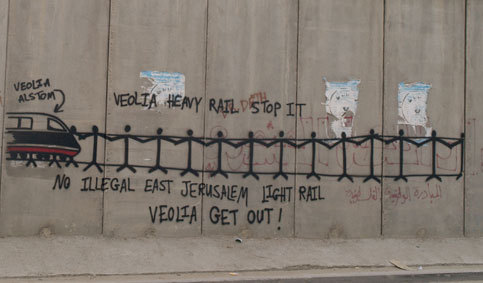 Veolia protest on apartheid wall near Ramallah
And these victories are having an impact on the ground in the settlements. A recent Jerusalem Post article (3 April 2009) revealed widespread disillusionment amongst settlers who have been hit hard by the combination of the intifada and the boycott. A settler living on the Ma'aleh Ephraim settlement in the Jordan Valley, sometimes refered to as Israels capital in the Jordan Valley, revealed "there was an industrial zone, but since 2002 the hangars are empty. It's impossible to bring people there and foreign companies won't come because of the boycott [on West Bank products]." House prices in Ma'aleh Ephraim have dropped to a third of their value, and around 80% of the settlers who founded the colony in 1978 have left and a similar proportion of the current population of around 1,400 would leave if they had the means to do so. This is a far higher figure then the Nov 2005 Israeli survey which found that "25% of settlers would leave immediately if they were offered comparable housing within the Green Line."[33]
In our research we highlight any settlement linkage.
729 Israeli Barcode?
It has been suggested that one way to identify Israeli products is to look at the barcode. The first 3 digits of the EAN 13 digit barcode indicates the country in which the barcode was assigned, barcodes assigned in Israel start with the number 729. Unfortunately Israeli products can still be assigned barcodes outside of Israel, for example a UK company selling Israeli products may assign UK barcodes to it. The two examples below show an Israeli Keter product rebranded Homebase which has retained the Israeli barcode (729), and a Tivall product which has been produced and packed in Israel for Tesco - yet it has acquired a UK barcode (500). So whilst a 729 barcode is a good indication that the product has been made by an Israeli company, not all Israeli goods have 729 barcodes.
2: ISRAELI GOODS IN UK STORES
FRESH PRODUCE
According to Israels Agricultural Ministry, in 2007 exports of Israeli fresh agricultural produce was worth $1.34 billion and most of it, some 80% was exported to the EU[5]. If you visit the fruit and vegetables section of any supermarket in the UK you will discover a disproportionately large amount of fresh produce imported from Israel and its illegal settlements on the Occupied Palestinian Territories.
Potatoes
This even includes Israeli potatoes, shipped over 2000 miles to compete with the UKs own indigenous main crop. Two in every three potatoes Israel exports to the EU ends up in the UK[1], even Israeli King Edward potatoes have been seen on the shelves of M&S![2] Last year Israeli exporter Mehadrin Tnuport Export (MTEX) boasted of tripling its potato sales to the UK, this despite the frosts which had badly hit the israeli potato harvest.[4] One of the regions where potatoes are grown is the water rich occupied Golan Heights, though this special crop is mainly for producing potato seed which are then used to grow potatoes for export through out Israel[3].
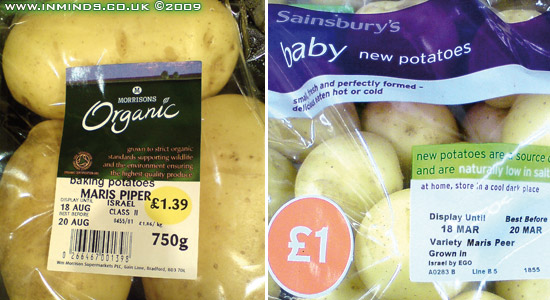 Two in every three potatoes Israel exports to the EU end up in the UK - here Israeli baking potatoes in Morrisons (Organic Maris Piper), and baby new potatoes in Sainsubry's (Maris Peer) 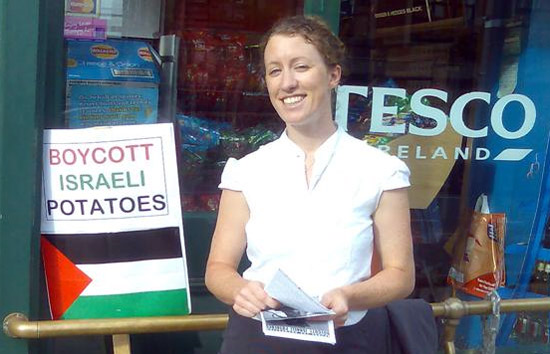 "Boycott Israeli Potatoes" Picket outside Tesco's in Ireland (17 Aug 2007) Herbs
Most supermarkets sell fresh herbs sourced from the illegal Israeli settlements on the West Bank. These are labelled 'West Bank' or 'Israel'. 'West Bank' never refers to Palestinian goods as they don't make it past the military checkpoints, and the little that does like Zaytoun olive oil is clearly labelled 'Palestine'. Often settlements goods are labelled 'Produce of Israel' to avoid payment of tariffs when entering the EU - according to the EU-Israel Association Agreement goods produced outside the recognised borders of Israel (ie on the israeli settlements on the Palestinian Occupied Territories) are not exhempt from import duties. A July 2008 Channel 4 news report revealed herbs grown on the illegal No'omi settlement on the West Bank, destined for the UK, were being mislabelled 'produce of Israel' in breach of the EU-Israel Association Agreement.[6] The No'omi settlement, built in 1982 on stolen land, is adjacent to Jericho and today houses 130 colonists. In the same report Asda supermarkets statement read "We don't take any exports from the West Bank", yet as the photo below taken 7 months later, in Feb 2009, reveals Asda still sells herbs grown on the illegal settlements on the West Bank (see letter campaign below).
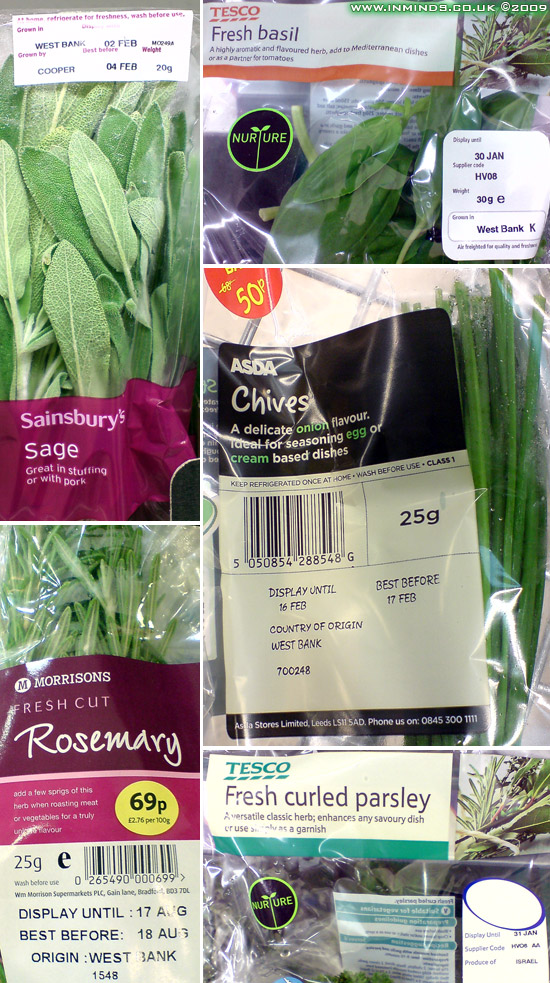 All the major supermarkets sell herbs from the illegal israeli settlements (labeled 'West Bank' or 'Israel'). Waitrose (not pictured above) is perhaps the worst offender when it comes to selling settlement goods.
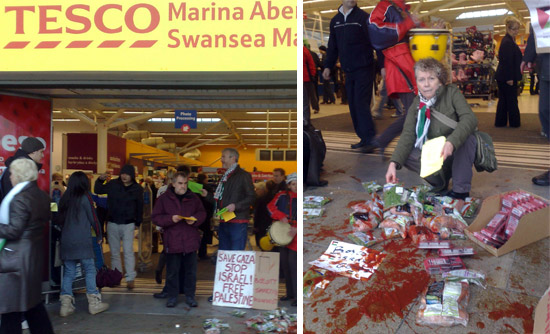 A group of activists seized produce labeled as ‘WEST BANK’ as country of origin at a TESCO store in Swansea’s City Centre. The trollies, full of produce were up-turned at the supermarket entrance and covered in fake blood to represent the lives lost in Gaza. Grandmother of four, D. Murphy said: "We believe that Tesco’s are accessories to crimes under international law – under Geneva Conventions and UN resolutions signed in our name. By removing these unlawful goods from the shelves we are enforcing the law, not breaking it. We are asking the people of Wales to support the national boycott of Israeli goods." (27 Jan 2009) Peppers
Perhaps the most pervasive israeli fresh produce in our supermarkets is the bell pepper. A quick visit to a local supermarket (Tesco, but it could have been any supermarket) revealed they had on display 18 baskets of bell peppers (see below) with 7 different products for sale. Every single one of them bar one was from Israel, and the one that wasn't was part of a pack in which the other peppers were from Israel, so effectively you couldn't buy a pepper from Tesco's without supporting Israel!
 Israel is the country that has recorded the highest increase in volume of all the countries that export peppers to the EU: the figure of 27,369 tonnes exported in 2002 had risen 250% to 96,492 tonnes by 2007,[8] and the forecast for 2008 was 110-120 tonnes[10]. Pepper growing needs land with water resources which restricts its cultivation to the Arava Valley in Southern Israel and the Jordan Valley in the occupied West Bank. To achieve these record exports to the EU, the pepper production area has had to dramatically increase. Between 2007-2008 it increased by 25%, and in 2008-2009 the increase was 15%. In an interview Mr. Yiftach Yechie, Arava area manager for Agrexco-Carmel, Israels largest exporter of fresh produce, indicated that the increase in the cultivation area was mainly in the Jordan Valley where the crop had "doubled" in 2007-2008 (increase in Arava was only 8-10%)[10], this is indicative of theft of more Palestinian land by Israel to use for growing peppers for export to Europe.
The Jordan Valley, comprising nearly 30% of the West Bank, is the most fertile part of the Palestinian Territory. The Israeli army controls 44 percent of the land with another 50 percent held by the 36 illegal settlements in the valley[16]. Indigenous Palestinians are left with only six percent of their land, and Israel has its covetous eyes on that remaining land. Last April the Israeli Army handed the villagers of Bardala village in the northern Jordan Valley a military order to confiscate 238 dunums (nearly a 1000 acres) of their land[17]. The order stated the army was "confiscating these lands for military reasons to build the Security Wall"[18], in November 2003 the army had already confiscated 424 dunums for the same given reason. But this is just the tip of the theft, when this section of the "security wall" is built it will cut the village off from most of its farming land - the villagers will lose access to over 5000 dunums (well over 20,000 acres) of agricultural land! Some of the confiscated land from the village of Bardala and its neighbouring villages has already been used to create illegal roads connecting the nearby israeli settlements of Mehola and Giv'at Sal'it.
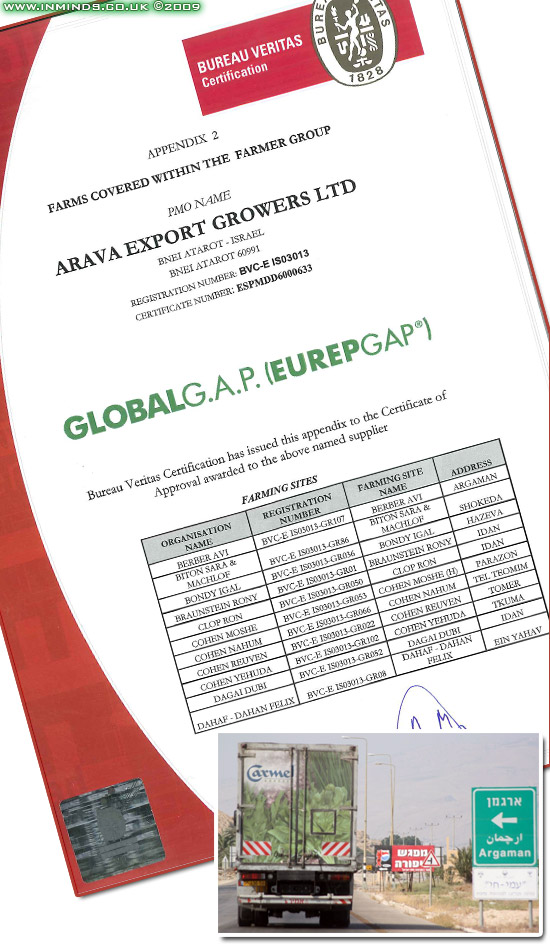 Arava Export Growers GlobalGAP Certificate reveals its many farms on the settlements in the West Bank starting with the Berber Avi farm on the Argaman settlement in the Jordan Valley. The Argaman settlement's name betrays its dark history, steeped in ethnic cleansing. In Hebrew it literally means 'purple' but is actually an acronym to honour two Nahal commanders: Lt. Colonel Arik Regev and Lt. GAd MANela. Israels Nahal military brigade was specifically set up to support Jewish settlement growth and expansion by ethnically cleansing Palestinian people from their land at gun point, to initially create military outposts and gradually transfer the land on to the settlers. Argaman was one such outpost, taken by the Nahal brigade in 1968 and converted to an agricultural settlement in 1971. Today 166 colonists live there, sustained by exports of agricultural produce to Europe. The inset photo shows a truck belonging to Israels #1 fresh produce exporter Carmel Agrexco at the Argaman settlement. Global GAP is a private body set up by retailers to set standards for the certification of agricultural products around the globe (GAP = Good Agricultural Practice)[11]. Supermarkets require producers to be Global GAP certified before accepting supply from them. The certificates can reveal what produce is grown and the farming site where it is grown. Israels third leading exporter of fresh produce is Arava Export Growers Ltd. Its Global GAP certificates reveals that its main crop by acarage is Herbs (309.7 Hectares) and Peppers (242.05 Hectares) and that nearly a fifth of its registered farms are located on the illegal settlements in the West Bank (17 out of 92)[12]. These settlements include Argaman, Fatzael, Masua, Mehola (Jordan River Herbs & others), Netiv Agdud, and Tomer. For Organic produce the figure is far worse, with half of Arava Export Growers farms that meet Organic Certification (NOP) located on the settlement of Mechola (Mehola), these include Jordan River Herbs (registered under its owner name - Shamay Foraiter), and are certified to grow herbs and red peppers[13]. Arava Export Growers website also displays Tesco's own "Natures Choice" Certificate of Comformity for supplying Tesco with herbs[14].
Jaffa
In 2008, Israel's citrus exports totaled approximately $100 million, mainly to Western Europe. The UK is the No. 1 market for Israeli citrus, followed by Scandinavia, Russia, Germany and France[109].
The most recognisable Israeli brand on the supermarket shelves is the JAFFA brand seen on citrus fruits. Its owned by the Israel Citrus Marketing Board and is licenced to several supplers including Agrexco and Mehadrin Tnuport Export (MTEX). MTEX is Israel’s largest grower and exporter of citrus fruit responsible for 67% of overseas sales[15]. They supply most of the supermarkets including Tesco and Sainsburys. Their other exports include Madjoul dates which their website admits are grown in the Jordan Valley, on the occupied West Bank[19].
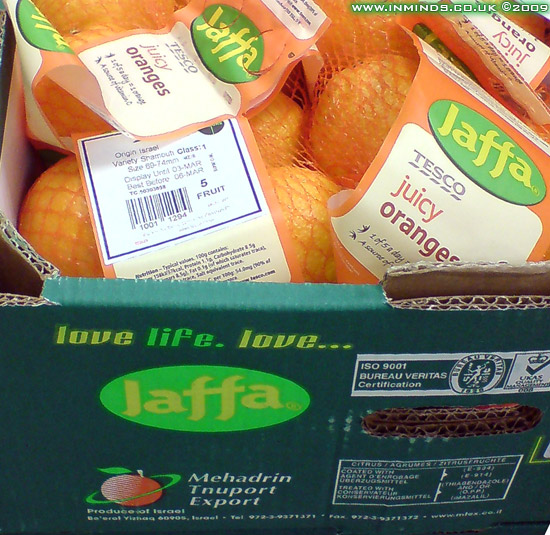 Mehadrin Jaffa Oranges in Tesco
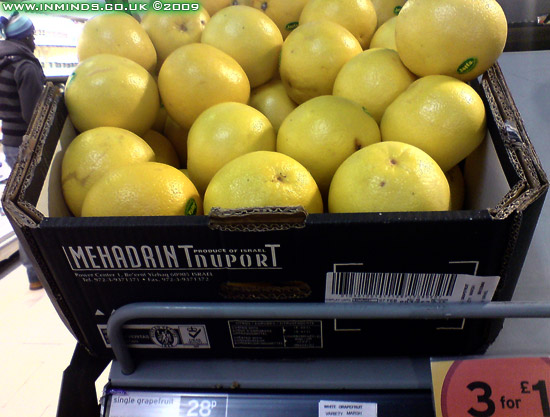 Mehadrin Jaffa Grapefruit in Sainsburys 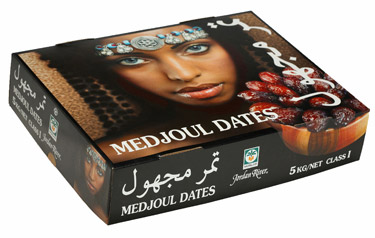 Jordan River Dates - 5kg "Yemenite" box Can you tell its Israeli?
Dates
Growing dates is one of the major agricultural activities carried out by nearly half of the Israeli settlements located in the Jordan Valley, it’s their most profitable crop[44], contributing significantly to their economic viability. Most of the Israeli date crop - up to 80%, is exported, maily to europe where it has around 10% market share. In 2005, dates were Israels leading fruit export[45].
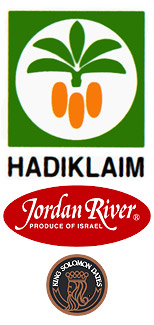 Israeli date brands
The two major israeli companies involved are Agrexco and Hadiklaim. Israeli state owned Agrexco handles 60-70% of all goods produced in the illegal settlements[48]. Its dates have brand names Carmel, Jordan Plains and Jordan Valley. Hadiklaim is the Israeli Date Growers Cooperative, made up of among others illegal settler plantations in the Jordan Valley[47]. Hadiklaim sells 65 percent of the all dates produced in Israel and the settlements[45]. Its dates have brand names King Solomon (medjools) and Jordan River (deglet-noors). Hadiklaim also supply Israeli dates to supermarkets and retail chains who market them under their own brand names. These include Marks & Spencer's, Sainsbury's, Tesco's, and Waitrose. For more information on Israeli dates see our Boycott Isareli Dates Campaign[46].
Following our successful 'Boycott Israeli Dates Campaign' last Ramadan, which featured in its video Sainsburys organic Medjool dates grown on the illegal settlement of Netiv Hagdud, Sainsburys have since chosen to hide the names of the settlements where their dates are grown. As the photo below shows, clearly the removal of such vital details is not due to shortage of space on the label. We can only assume that the purpose of removing the name of the settlement where the dates are grown is to further confuse the customer in to thinking "Grown in West Bank" might refer to Palestinian produce which clearly is not the case. Also, their new label for the non-organic range now refers to Medjool dates being "traditionally reserved in Morocco for royalty" thus further confusing their true origin, seeped in occupation nearly 2000 miles away from any Moroccan royalty.
Other fresh produce
Other fresh produce from Israel and the settlements found in UK supermarkets includes avocado, sharon fruit, sweet potato, tomato on vine, cherry tomato, galia melon, long sweet pepper, chilli, fig, passion fruit, strawberry, grapes, mango, plum, pomegranate, lychee and nectarine.
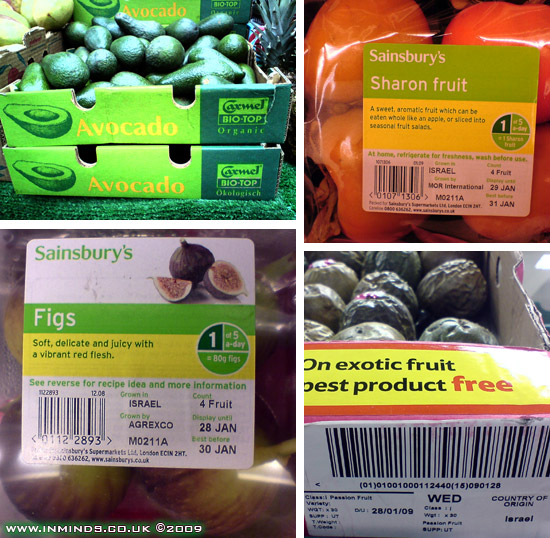 Israeli fresh produce: sharon fruit, passion fruit, avocados and figs. FOOD COMPANIES
The presence of manufactured Israeli food on UK supermarket shelves is not on the same scale as Israeli fresh produce, but never the less its a growing presence that cannot be ignored.
Osem
Leading Israeli food manufacturer Osem has a turnover of $712 million and nearly 5000 employees[59]. Its majority owned by Nestle (53.8%)[51]. It has 14 factories in Israel.
Its brands include Beit Hashitah (pickles), Of Tov (frozen meat products), Habait (ready made cakes) and Sabra Salads (ready-made salads and spreads). Osem also owns 58% of meat-substitute manufacturer Tivall Foods[52](see below).
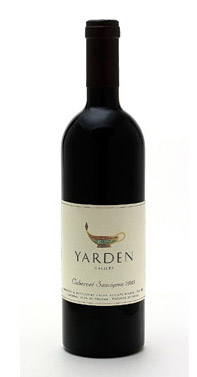 Yarden Wine from Golan Heights Winery
According to Osem's website its products are sold in Marks & Spencer, Tesco, Sainsbury and Morrison, with each store marketing them under their own label. It employs two big sub-contractors to handle distribution to the chain stores, the first is dedicated to Marks and Spencer, while the second handles all other supermarkets.[57] Waitrose online site Ocado sells a range of Osem products from soups, crackers and croutons. Tesco online sells a range of Osem cakes.
Recently, in April 2009, Osem UK announced its acquisition of Yarden GB[53]. Yarden GB's product range includes chilled meats and Yarden wines from the Golan Heights Winery, located in Katzrin on the occupied Syrian Golan Heights. Golan Heights Winery exports 38% of all Israeli wines[59], its wine brands also include Gamla and Golan. According to Yarden GB's website its products are available in Tesco, Asda, Sainsbury, Morrisons, Budgens, Somerfield, Waitrose and Harrods.[60] Waitrose online site Ocado sells a range of Yarden meat and houmous products.
Tivall
Israeli food company Tivall is one of the world's leading suppliers of meat-substitute products. It has a turnover of $74 million and has 451 employees[59] It has a manufacturing base at Kibbutz Lochamei Hagetaot in Northern Israel, and a new facility in the Czech Republic.
Tivall brand products can mainly be found in health food stores - their website mentions Holland & Barrett, Fresh & Wild, and Planet Organic[61]. But most of their sales are through the supermarkets who rebrand Tivall products as part of their own frozen "Meat-free" range. This includes Tesco, Asda, Morrisons and Sainsbury's. Morrisons also stocks Tivall brand Frankfurter. Waitrose online site Ocado sells a full range of Tivall products.
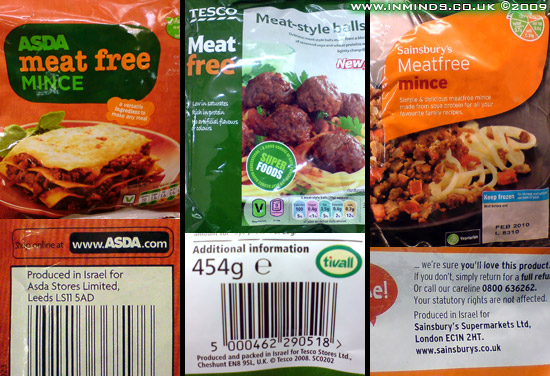 Tivall meat-free mice products branded as Asda, Tesco, and Sainsbury's
Strauss
Israels second largest food company is the Strauss Group with turnover $1.7 billion and 11,000 employees[49]. Strauss is the sixth largest coffee company in the world (eastern Europe and Brazil). Its parners include Danone (ownes 20% of Strauss Health) and Pepsico (owns 50% of Sabra and 50% of Strauss Frito-Lay (salty snacks))[50].
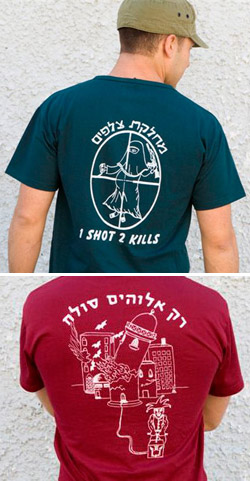
Graduation T-Shirts from the Givati(top)
and Golani(bottom) platoons which have been
"adopted" by Israeli food company Strauss.
The Golani t-shirt printed after the recent
attack on Gaza, in which mosques were
trageted for destruction, shows a Golani
destroying a mosque with the inscription,
"Only God forgives." The sharpshooter's
T-shirt from the Givati Brigade shows a
pregnant Palestinian woman with a bull's-
eye superimposed on her belly, with the
slogan, in English, "1 shot, 2 kills."
Another Givati t-shirt read "Let every Arab
mother know that her son's fate is in my
hands!" An ex-soldier in an inteview with
Haaretz newspaper recalls "There's a Golani
or Givati shirt of a soldier raping a girl,
and underneath it says, 'No virgins, no
terror attacks.' I laughed, but it was
pretty awful."[56] The New York based BDS group Adalah is running a boycott camapign against Strauss. Adalah point out[54] that the Strauss Group on its website, on the page on "Corporate Responsibility - Communinity Involvement" they reveal their deep rooted support for the Israeli army, and in particular the infamous Golani platoon, known for its brutality, which the Straus group has "adopted" for over 30 years. They have also adopted troops from the Givati platoon:
"Our connection with soldiers goes as far back as the country, and even further. We see a mission and need to continue to provide our soldiers with support, to enhance their quality of life and service conditions, and sweeten their special moments. We have adopted the Golani reconnaissance platoon for over 30 years and provide them with an ongoing variety of food products for their training or missions, and provide personal care packages for each soldier that completes the path. We have also adopted the Southern Shualei Shimshon troops from the Givati platoon with the goal of improving their service conditions and being there at the front to spoil them with our best products."
Corporate Responsibility - Strauss Group[55]
Unlike the US where its brands like Sabra (hummus dips) and Max Brenner (chocolate) are well known, it has a negligible direct presence in the UK. (Note that Osem's Sabra Salad which is available in UK supermarkets should not be confused with Strauss Sabra Salad).
PLASTICS
Israeli plastic products are conspiciously prevelant in DIY warehouse stores like B&Q and Homebase. Next time you see a plastic toolbox or plastic garden furniture or shelves check them out - they may be made in Israel.
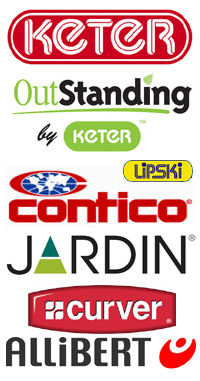 Keter brands, subsidiaries and sister companies (all owned by Israel's Sagol family)
Keter
Keter Group is one of the world’s leading manufacturers and marketers of plastic consumer products. The Israeli plastics giant is privately owned by the Sagol family[81], has 4750 employees, 29 plants around the world, and a turnover of $1.1 billion[58], 90% of which is derived from overseas sales[72]. Its product range includes garden furniture, outdoor storage solutions and sheds, shelving systems and utility cabinets, tool boxes and storage products for the DIY market, household products, baby and toddler products.
Its brands, subsidiaries, and sister companies (all owned by the Sagol family) include 'OutStanding Solutions' (Keter garden storage), Lipski (plumbing accessories), Allibert (bathroom accessories), Curver (plastic home & food storage), Jardin (garden furniture), and Contico Europe (plastic storage boxes)[83]. Whilst all the profits go to Israel, not all the products are produced in Israel, for example Allibert has factories in France & Belgium, whilst Curver has factories in Poland & Hungary.
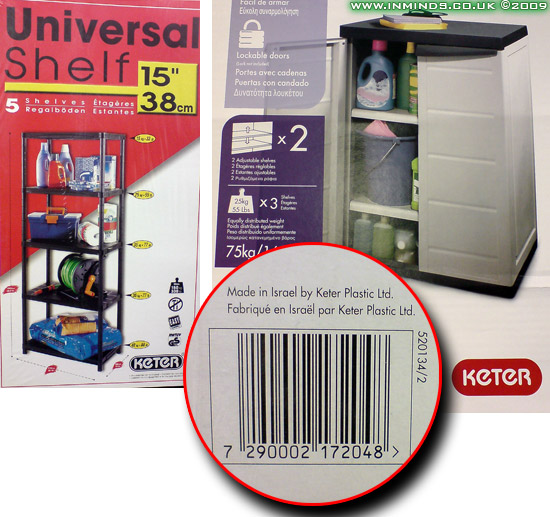 Israeli Keter products in B&Q 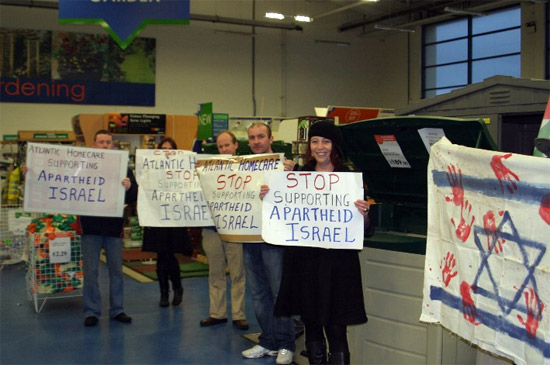 Israeli plastics giant Keter has factories in the illegal settlements on the West Bank. Activists protest against Keter garden furniture on sale in Atlantic Homecare in Limerick, Ireland (11 jan 2009). In the UK Keter products are sold in B&Q, Homebase and Argos. Keter operates 12 factories in Israel and the West Bank[82], and has its headquarters in Herzliya. At least 2 of the 12 factories are located in the West Bank (in Barkan and Oranit)[78].
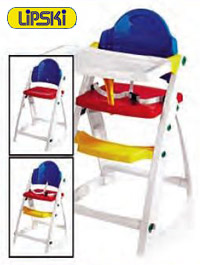 Lipski highchair
One of Keter's subsidiaries, Lipski Plastic is situated in the illegal Barkan settlement on the West Bank[73]. Its baby highchairs and toilet trainers have until recently been available in Argos. But it main product range now is plastic plumbing fixtures, cisterns and toilet seats.
Interestingly, Lipski attributed its profit growth of 160% in 1991 to "moving the factory to the Barkan Industrial Zone, where it obtains government tax benefits"[74]. The Barkan Industrial Zone was opened in 1991, having been built on land stolen from the Palestinian village of Haris[76]. This is the sad reality, companies willing to trample over the rights of Palestinians and join in their oppression, all for a tax break.
Another advantage for these factories located in the West Bank is the knowledge that the Israeli government is lax in its enforcement of environmental laws in the settlements, they can pollute without redress.
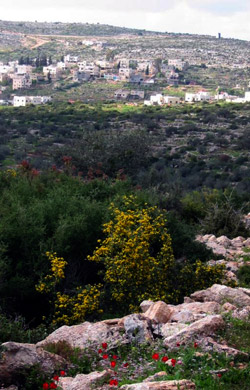 Bruqin Village (in the valley) poisoned by the pollutants from the factories of Barkan Industrial Zone behind the annexation wall on the hilltop above the village.
The village of Bruqin, having already lost large part of its land - stolen to create the Ariel settlement[77], is now being systematically poisoned by the factories on the nearby Barkan Industrial Zone. According to the Applied Research Institute of Jerusalem, 80 factories from Ariel's Barkan industrial zone discharge 0.81 million cubic meters of wastewater per year into nearby valleys[79]. Liquid waste and black water - pollutants from the factories - combined with sewage from the hilltop settlements have formed a river running through Bruqin village, passing only 8 meters away from Palestinian homes. These liquid poisons have caused a large number of health problems in the village most important of which is cancer due to soil and crop pollution with industrial wastes from the factories. In addition, there is a number of cases of infectious skin disease due to the large concentration of mosquitoes in the vicinity of the factories waste dump sites. The poison streams have also led to the death of trees and crops located in its immediate vicinity. Analysis carried out by the Palestinian Ministry of Health in 2007 on water samples taken from the school, houses and wells in Bruqin village confirmed the existence of biological pollutants in the water.[75] Although Bruqin is located in the West Bank's most water-rich region, its clean water supply is redirected to Ariel and is constantly without enough clean water, Israeli settlers consume five times more water than local Palestinians[79].
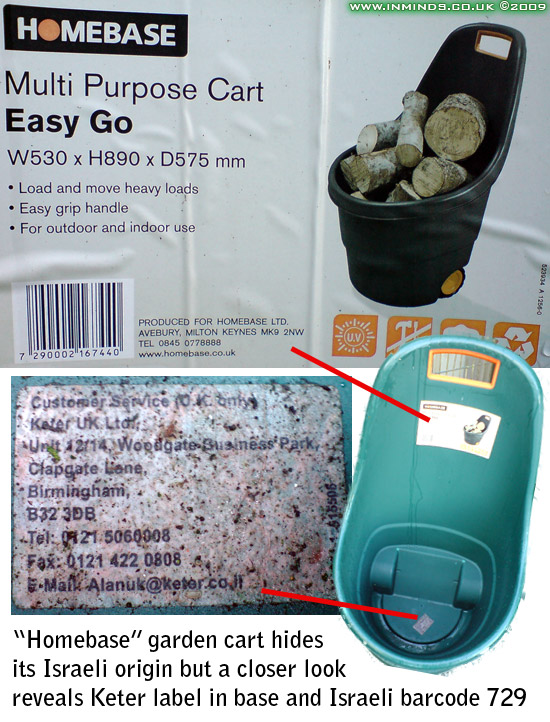 Homebase garden cart - relabelled Keter product Keter products are also sold in DIY superstores B&Q and Homebase. Both re-brand them as their own, often in the process hiding the products Israeli origins.
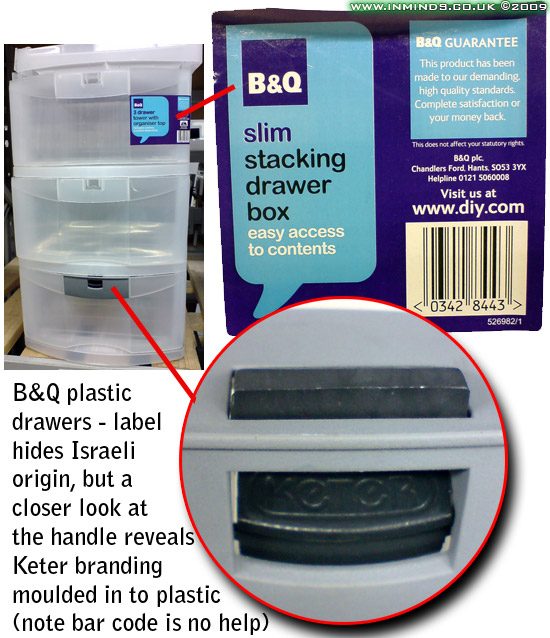 B&Q plastic drawers - relabelled Keter product
Keter in 2006 sponsored a conference on Israels National Security with a speaker list which included over a dozen IDF generals from war criminal Lt.Gen. Shaul Mofaz to Maj.Gen. Yaakov Amidror who proposes to permanently annex the Jordan Valley and much of the remaining West Bank to Israel in defiance of international law.[80]
Keter works closely with Black & Decker[84], which includes a licencing arrangement wherby Keter products are sold under the Black & Decker brand name. Black & Decker is now a tainted brand, you might be buying Israeli Keter every time you buy Black & Decker.
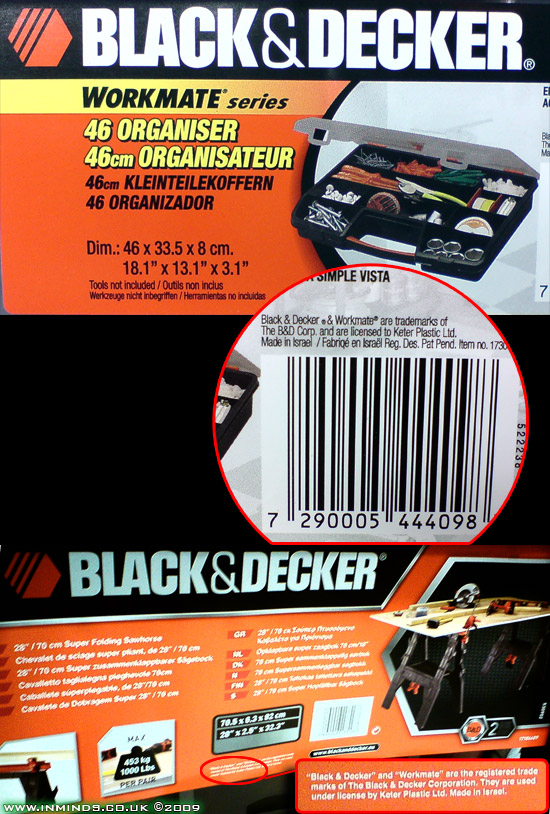 Black & Decker products made in Israel by Keter under licence notice the "729 Israel barcode" - not all Israeli goods have it, but when you see it, its Israeli ZAG - Stanley Israel
 ZAG - Israeli subsiduary of Stanley Works
ZAG-Stanley is a manufactur of tool storage products in plastic, metal, and fabric for the DIY market. In 1998 Stanley Works Inc, a US manufacturer and marketer of tools, purchased 90% of ZAG for $117 million (the remaining 10% is held by ZAG founder and CEO Zvi Yemini)[88][89].
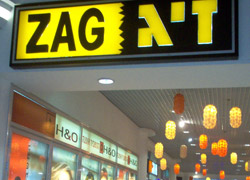 ZAG in an Israeli shopping mall
ZAG-Stanley has its headquarters in Rosh Ha'ayin with two factories in Northern Israel, in Karmiel and Migdal Ha'Emek.
Its line of products includes tool boxes, bulk storage containers, drawer and bin systems, sawhorses and workbenches, small parts organizers, gardening tools, bathroom accessories, and kitchen and food storage products.[86]
ZAG-Stanley markets its products under the Stanley brand, including Stanley’s FatMax and FatMax Xtreme brands, as well as under the ZAG brand and private label brands. Its products are sold in B&Q and Homebase.[85]
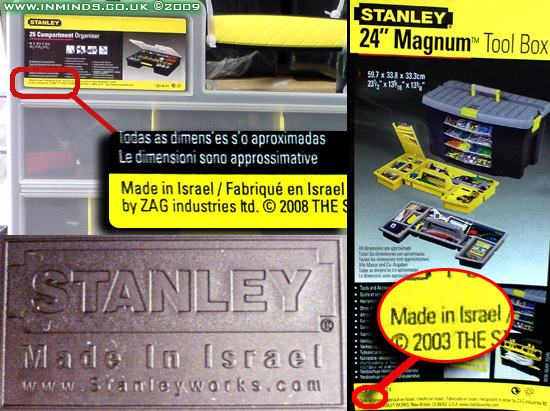 Stanley Organiser manufactured in Israel by ZAG Ltd In 1997, ZAG Industries signed a deal with Black & Decker to to produce tool cases to be sold under the Black & Decker name. It is unclear if this arrangement continued after Stanley Works purchase of ZAG[87].
Having bought ZAG for $117 million in 1998, Stanley Works tried to sell it off to Fox Paine & Company LLC in 2006, apparently the asking price of $110 million was way too high.[90]
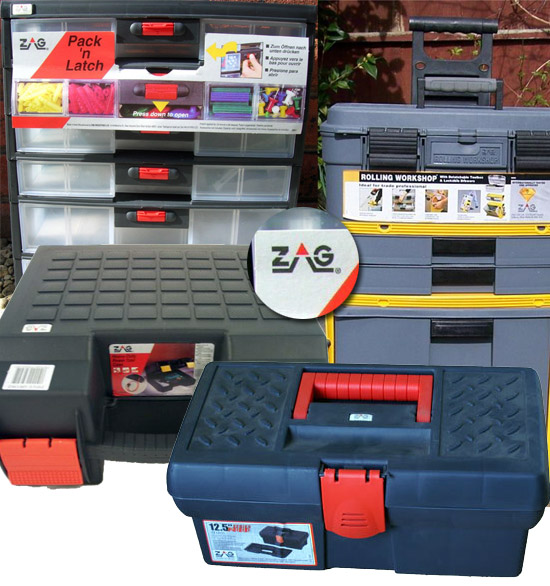 Sample of products sold under the ZAG brand TOYS
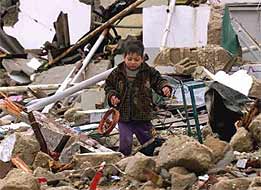 A Palestinian child weeps as he recoveres a homemade toy from the rubble of his home which was among several destroyed by Israeli army tanks and bulldozers January 10, 2002 in the Rafah refugee camp in Gaza.
It is perhaps especially shocking to see Israeli toys in UK stores competing for a place in our childrens lives, knowing that the profits from such toys help pay for a killing machine that targets children.
It is then perhaps not surprising that several of the Israeli toy manufactures have gone to great lengths to hide their Israeli origins, making it even more important for us to expose them.
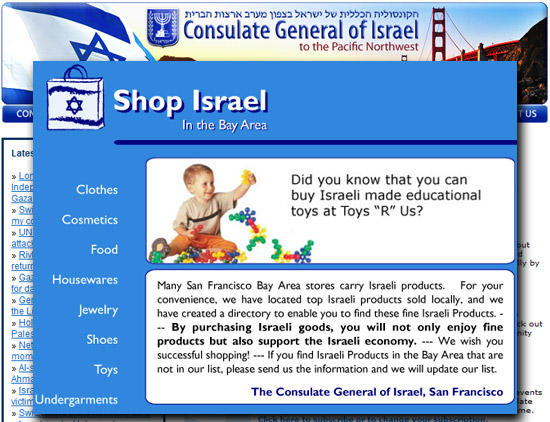 Consulate General of Israel promoting Israeli toys - a sign of desperation? Image shows the Interstar construction set made in the Tip Top Toys Star Ltd factory located in the illegal Barkan Industrial Zone on the West Bank, its branded Halilit in the UK and Edushape in the USA. (src: http://www.israeliconsulate.org/shop/) Tiny Love
Looking at Tiny Love website one would never realise its an Israeli company, its only when you read the small print under "Terms of Use" that it reveals Tiny Love Ltd is "a corporation incorporated under the laws of Israel, having its principle office in Israel"[91].
Tiny Love, located in Tel Aviv, is part of the Shilav Group. Tiny Love was founded in 1992 as a spin-off of the Shilav retail chain - Israels leading baby supply/toy store chain with its 30 stores arcoss Israel. Tiny Love specialises in toys for babies under the age of two. In 2004 the company held a 25 percent global market share for musical mobiles and activity gyms, accounting for about 3 percent of the global market for baby toys, with an annual export of $50-60 million and a revenue growth rate at the time of 25% per year.[92]
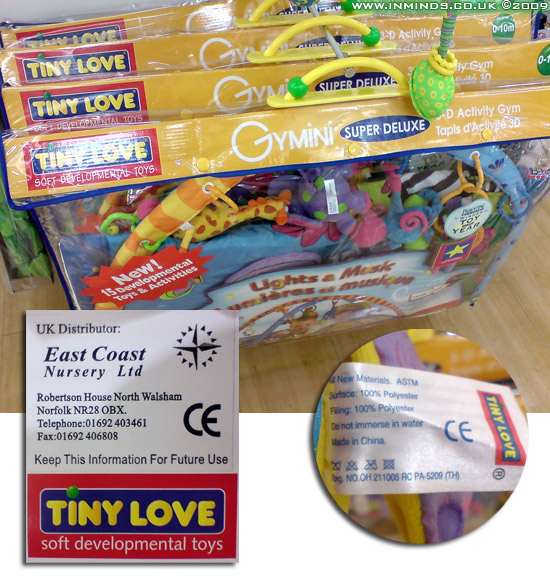 Tiny Love products in Mothercare. East Coast Nursery Ltd of Norfolk is the UK distributer for Israeli toy manufacturers Tiny Toys and Taf Toys. Note that whilst Tiny Toys is an Israeli company and all profits go to Israel, the manufacturing happens in China
Jonathan Segal, Tiny Love's International Marketing Manager explained that Tiny Love from its foundation is totally focused on export: "In most cases, a company bases itself in its home market, and then branches out. But we began as a brand of developmental toys for the international market from day one,"[93]
The popularity of Tiny Love products has opened the doors for the marketing of Shilav children's clothing abroad, which has also proved successful.[92]
Whilst the company is in Israel, the manufacturing happens in China. Half ts sales are in the United States and the rest are in Europe, Japan and Australia.[92]
One of the stores of Tiny Love parent company Shilav is located on the West Bank in Shilat in no-mans land. Shilat settlement was created in 1977.[93]
In the UK, Mothercare stocks 15 Tiny Love products[97] whilst Toys R Us stocks 20 of them.
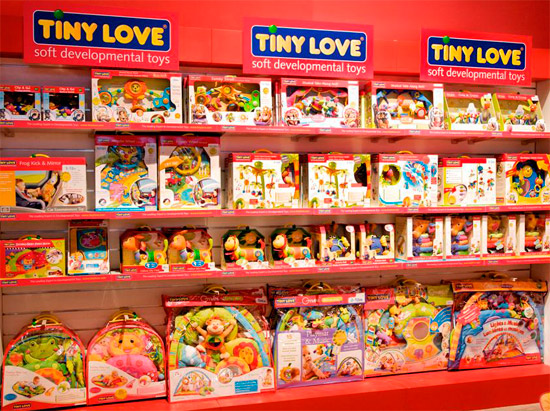 Tiny Love products on display at a trade show in Europe Taf Toys
Taf Toys is an Israeli toy manufacturer specialising in soft toys. Its part of Taf Plastic Products Ltd, and is located in central Israel in Tel Yitzhak where it employs less than a dozen people.[94]
Taf Toys hides its Israeli origin extremely well with no mention of Israel at all on its website. In fact if you do a google site search for the word 'israel' on the Taf Toys website it only returns one hit and thats on a drop down menu on the customer feedback form to select your country of origin. Interestingly the website domain registration administrative contact email address is given as taftoys@ibm.com - we are unsure what the IBM connection is.
Taf Toys products, available in over 30 countries, include play gyms, activity mats, stroller and car toys, musical soft dolls, and plastic toddler toys.[95]
In the UK, Toys R Us stocks 8 Taf Toys products under its BabiesRUs section[96]. Taf Toys UK distributer is East Coast Nursery Ltd.
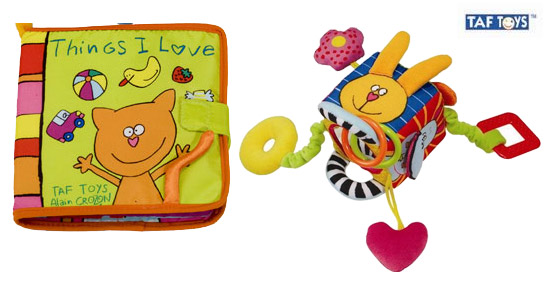 Taf Toys - sample products. Apparently French illustrator Alain Crozon has been a key member of the Israeli companys design team since 1998.[107] Tip Top Toys Star Ltd
Tip Top Toys Star is an Israeli toy manufacturer with essentially one product range - its Interstar construction set. Interstar is a plastic building blocks kit (similar to 'Sticklebricks') which is avialable in different configurations.[102]
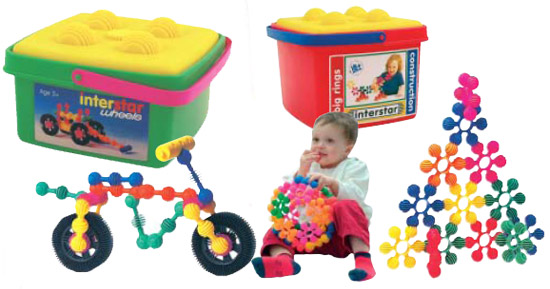 Interstar construction sets (photo from Halilit catalogue) Tip Top Toys Star has its headquarters in central Israel in Ramat Gan[102]. Its production factory however is located on stolen land in the Barkan Industrial Zone on the occupied West Bank.[101]
Tip Top Toys Star Ltd has no presence outside of Israel and its Interstar product range is sold under the Halilit brand in the UK and Edushape in the USA. Interstar is sold in some branches of Toy Master and online by leading education suppliers Hope Education and NES Arnold. Their description of the Interstar product omits country of origin, one wonders how many teachers would order the product if they knew it was made in an illegal factory on stolen land and its sale helps fund settlements which break international law.
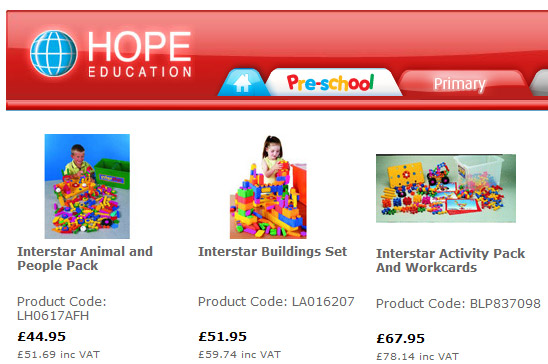 Interstar range on sale at school supplier Hope Education  Interstar range on sale at school supplier NES Arnold Halilit
Halilit is Israels largest manufacturer of Musical toys and instruments. Halilit is split in to two companies, one serving the israeli market (www.halilit.com) which mainly imports musical equipment to sell in israel, and the other the export company (www.halilit-israel.co.il).
The export company (www.halilit-israel.co.il) was formed in 1974, its products are mostly manufactured in Israel, and are firmly intended for export. Its located in Or Yehuda, in central Israel. Customers include Disney, Toys R Us, Early Learning, Gymboree and Honner.[98]
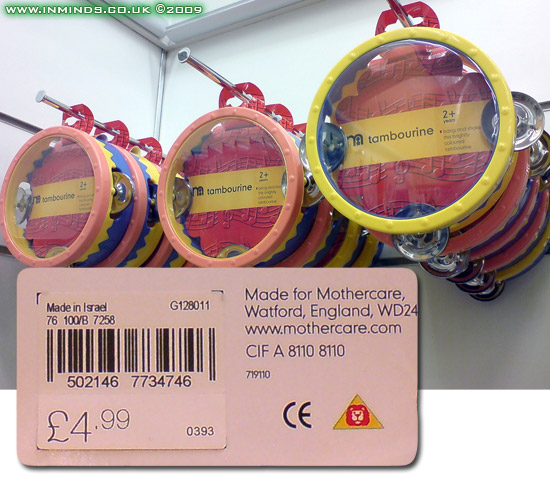 Halilit Tambourine rebarnded and on sale in Mothercare (label states "Made for Mothercare") 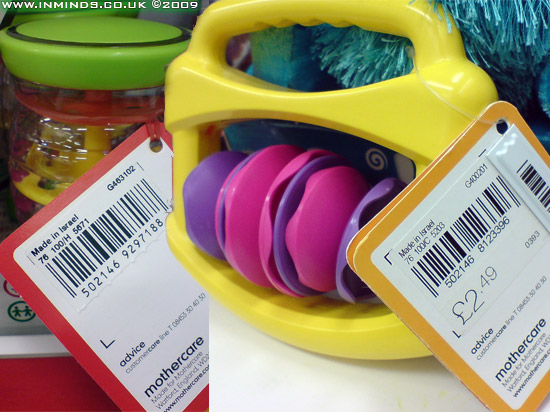 Halilit Musical Toys rebranded and on sale in Mothercare (labels states "Made for Mothercare")  Halilit Catalogue back cover shows Interstar kit which is manufactured in an illegal factory built on stolen land in the West Bank
Halilit has a dedicated presence in the UK (www.halilit.co.uk), located in Accrington, near Blackburn in Lanc. It's described as: "Halilit is a supplier of high quality toys in the 0-8 age group. Our core range is based on musical instruments for children and we also supply infant and nursery toys, bath toys and games. Our customer base ranges from independent shops to familiar retailers such as Mothercare, Early Learning Centre, Toys R Us and Boots. We also work with mail order companies and specialist educational suppliers. We have been operating in the toy industry for 26 years.. Our product categories include musical toys, games, bathtime, wooden puzzles, science kits, early learning and construction.".[99]
Their section on construction toys is dedicated to the Interstar construction toy: "Interstar is a construction toy developed by experts to stimulate and encourage your child's development."[100] What they fail to mention is that the Interstar factory is located on stolen land on the West Bank.[101] Other israeli brands Halilit markets include Edushape, Playsound, Rhythm Pals, and Sound Percussion.
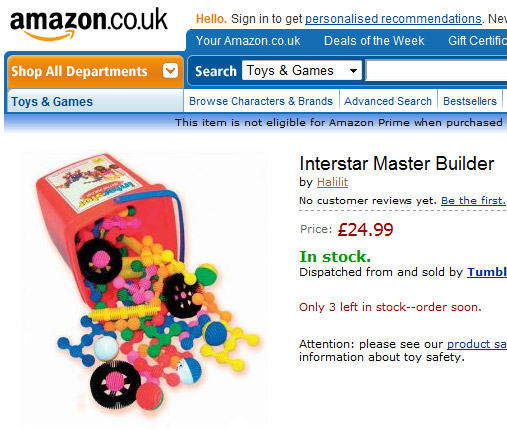 Interstar products sold under Halilit brand in UK (Amazon.co.uk)[106] A phone call to Halilit UK revealed that their musical toys are sold in the UK by Chamberlain Music, Toy R Us, Toy Master, LMS Music, Music Village, Early Learning Centre, John Lewis, and Mothercare whilst its Interstar toy is not so popular and is only sold in some branches of Toy Master.[103]
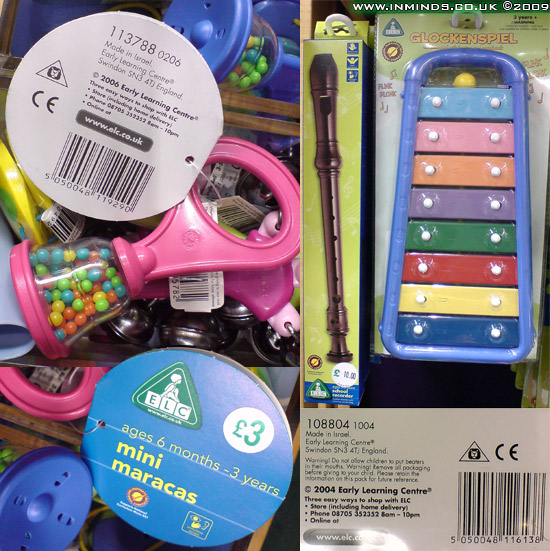 Halilit Musical Toys on sale in ELC (Early Learning Centre) (rebranded as ELC) Note that in April 2007 Mothercare bought ELC for £85 million Another major revenue channel for Halilit is the education market. The UK has 21,000 primary schools. Halilit has created special class room music packs, like "Key Stage One" pack and "Multicultural Instruments pack" to target this lucrative market. One wonders how many schools would still buy Halilit products if they knew that many of them are manufactured in illegal factories built on stolen land on the West Bank.
Education suppliers fall in to two categories. The first are specialist suppliers of music equipment to schools, these include Music Village Education, Chamberlain Music, Zings Education, DJ Music, and LMS Music Supplies. All of them sell Halilit musical products, which are clearly labelled "Halilit" and easily avoided.
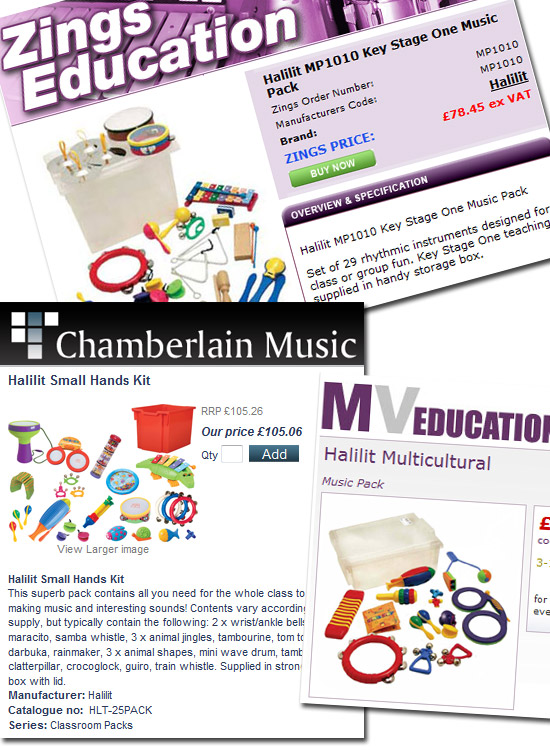 Halilit Musical packs targeting UK schools. Zings Education: Halilit Key Stage One Music Pack - "29 rythmic instruments designed for class or group fun"; Chamberlain Music: Halilit Small Hands Kit - 25 pack "all you need for the whole class to get busy making music"; Music Village Education: Halilit Multicultural Music Pack which apparently is very popular with customers ordering the Halilit Key Stage One Music Pack which they also sell. The second category, perhaps the larger of the two, is general suppliers of materials to schools. The two big names are NES Arnold and Hope Education. Both stock a full range of Halilit products, not limited to just musical items. These include Interstar kits, Edushape products, as well as the music packs. They also sell products from other Israeli suppliers like Tiny Love's Gymini activity gym. Shockingly both these key suppliers to schools omit the Israeli manufacturers name from the description of their products making it near impossible for schools to make an informed choice when ordering.(see letter campaign to correct this)
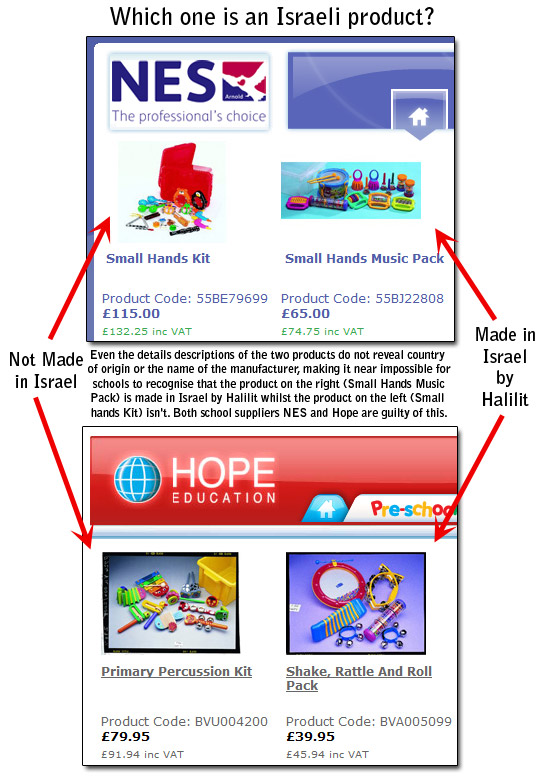 Two main suppliers to UK schools, NES and HOPE, both omit essential product information like the name of the manufacturer and country of origin.
In the US, Halilit products are sold under the Edushape brand as well as being stocked by Hohner Inc (hohnerkids.com). For example a 2006 shipment note indicates that at the start of the year Hohner imported 6 tons of musical toys from Halilit in Israel.[108]
Edushape
Edushape is an Israeli toy maufacture based in Rosh Ha’ayin in central Israel. Edushape specialise in soft toys made mainly from foam materials, their product range includes floor puzzles, playmats, giant blocks, sensory balls, and 'TubFun' bath toys. Most of their toys are manufactured in China.
 Edushape products - EduTile, EduBlocks, TubFun
Internationally Edushape has a presence in the US where is also markets Interstar and Halilit products under the Edushape brand. In the UK Edushape products are marketed by Halilit UK.
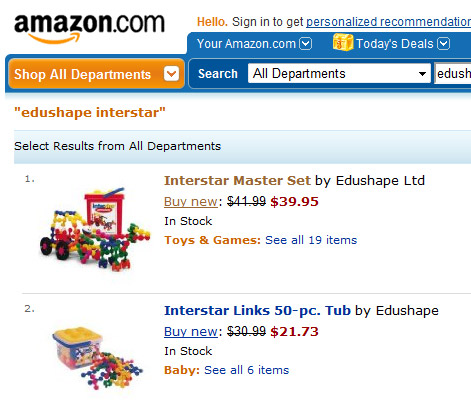 Interstar products sold under Edushape brand in US (Amazon.com)[105] TECHNOLOGY
Emblaze
3: CAMPAIGN - BOYCOTT 'MADE IN ISRAEL'
To support this camapign Innovative Minds and the Islamic Human Rights Commission have produced campaign leaflets which are avialable upon request.
[1]http://www.potato.org.uk/media_files/euro_potato/f-jan_09.pdf
[2]http://www.bigcampaign.org/index.php?page=who_sells_israeli_goods
[3]http://www.lanra.uga.edu/potato/mideast/israel.htm (13 year old article - use of Israeli seed has increased since then)
[4]http://www.freshinfo.com/index.php?s=n&ss=nd&sid=44673&s_txt=israel+potato&s_date=0&ms=5.9089436531067&offset=
[5]http://www.port2port.com/Index.asp?CategoryID=46&ArticleID=1675 [17 May 2008]
[6]The politics of shopping, by Girish Juneja [ 07 Jul 2008] http://www.channel4.com/news/articles/society/health/the+politics+of+shopping/2320772
[7]http://www.agrisupportonline.com/Articles/gworing_pepper_in_israel.htm
[8]S&G Peppers Today Newsletter 10 - August 2008 http://www.agrisupportonline.com/Articles/gworing_pepper_in_israel.htm
[9]http://www.freshplaza.com/news_detail.asp?id=38926
[10]http://www.pepperstoday.com/people.php?interview_id=12 [Mr. Yiftach Yechie, Arava area manager for Agrexco-Carmel interview Jan 2008]
[11]www.globalgap.org
[12]http://www.ecomtrade.co.il/emall/shops/1912/ARAVA%20EXPORT%20GROWERS%20GLOBALGAP%20CERT.PDF
[13]http://www.ecomtrade.co.il/Emall/shops/1912/imgBank/Organic%20Certificate%20NOP%20valid%20until%2012.08.jpg
[14]http://www.ecomtrade.co.il/emall/shops/1760/TNC%20Certificate%20H%202007.jpg
[15]http://duns100.dundb.co.il/2008/600019582/index.asp
[16]http://www.alarabiya.net/articles/2009/02/26/67236.html
[17]http://www.poica.org/editor/case_studies/view.php?recordID=1068
[18]http://palsolidarity.org/2007/04/2250
[19]http://www.mtex.co.il/logistic.aspx?Cat=2&SubCat=10
[20]http://www.thejc.com/articles/public-rejects-israel-boycott
[21]http://www.jpost.com/servlet/Satellite?cid=1238354477394&pagename=JPost%2FJPArticle%2FShowFull
http://www.alternativenews.org/content/view/1665/104/
http://markets.themarker.com/tmc/article.jhtml?ElementId=oc20090329_97785
[22]Shunned Israeli fruit being sold as Cypriot, March 19, 2009, by Nathan Morley
http://www.cyprus-mail.com/news/main.php?id=44677&archive=1
Fraudulent Aldi are selling Israeli grapefruit labeled: "Produce of Cyprus"
http://www.indymedia.ie/article/91559
[23]http://www.freshplaza.com/news_detail.asp?id=40192
[24]Cyprus checking out Israeli fruit con, by Nathan Morley, April 2, 2009
http://www.cyprus-mail.com/news/main.php?id=44946&archive=1
[25]http://www.irishtimes.com/newspaper/ireland/2008/0619/1213810561161.html
[26]http://www.inminds.co.uk/article.php?id=10283
[27]http://www.guardian.co.uk/world/2008/dec/01/israel-palestine-unilever
[28]http://www.thejc.com/articles/swedish-firm-quit-west-bank
[29]http://www.maannews.net/en/index.php?opr=ShowDetails&ID=31646
[30]http://spsc.scottishpsc.org.uk/index.php?option=com_content&view=article&id=2742:israels-eden-springs-taking-hits-from-successful-boycott-campaign&catid=249&Itemid=200132
[31]http://spsc.scottishpsc.org.uk/index.php?option=com_content&view=article&id=2751:how-is-eden-springs-complicit-in-violations-of-international-law&catid=284&Itemid=200133
[32]http://www.thejc.com/articles/dundee-students-boycott-eden-water
[33]http://www.jpost.com/servlet/Satellite?cid=1238562903056&pagename=JPArticle%2FShowFull
[34]http://engageonline.wordpress.com/2009/03/20/chris-of-cafe-crema-responds/
[35]http://www.guardian.co.uk/world/2009/apr/03/israel-gaza-attacks-boycotts-food-industry
[36]http://www.independent.co.uk/news/world/middle-east/hertz-withdraws-from-israeli-airline-deal-1418248.html
[37]http://www.ynetnews.com/articles/0,7340,L-3651655,00.html
[38]http://www.ynetnews.com/articles/0,7340,L-3648346,00.html
[39]http://www.guardian.co.uk/commentisfree/2009/jan/10/naomi-klein-boycott-israel
[40]http://www.guardian.co.uk/world/2009/feb/24/palestinian-olive-oil (inc audio)
[41]http://www.thenews.coop/news/Fairtrade/1519
[42]http://www.indymediascotland.org/node/13567
[43]http://www.corporatewatch.org/?lid=3207
[44] ITN News report by Julian Manning, Dec 2007
[45] Israeli dates at forefront of shift in market trends, by Daniel Kennemer, May 14, 2006, The Jerusalem Post
[46] http://www.inminds.co.uk/boycott-israeli-dates.php
[47]http://www.hadiklaim.com/market_catalog.asp mentions Israel's date growers in the Jordan Valley, the Beit Shean and the Arava Desert unite to create Hadiklaim Ltd.
[48] War on Want's Report "Profiting from the Occupation: Corporate Complicity in Israel's Occupation of Palestine"
[49]http://duns100.dundb.co.il/2008/600008874/index.asp
[50]http://www.strauss-group.com/AboutUs-BusinessPartners
[51]http://uk.reuters.com/article/consumerproducts-SP/idUKL15712420090101
[52]http://www.just-food.com/article.aspx?id=102061
[53]http://www.thejc.com/articles/osem-and-yarden-merge
http://www.oft.gov.uk/advice_and_resources/resource_base/Mergers_home/comment/Osem
[54]http://adalahny.org/index.php/boycott-divestment-a-sanction/consumer-boycotts-against-israel
[55]http://www.strauss-group.com/CommunityInvolvement
[56]http://www.haaretz.com/hasen/spages/1072466.html
[57]http://www.osem.co.il/Eng/_Articles/Article.asp?ArticleID=93&CategoryID=18&Page=1
[58]http://duns100.dundb.co.il/ts.cgi?tsscript=/2008e/e59a1 (assume NIS = 0.2416 US$)
[59]http://www.golanwines.co.il/general_eng.asp
[60]http://www.yardengb.ltd.uk/
[61]http://www.tivall.co.uk/content.asp?id=28
[62]http://www.thejc.com/articles/boycott-helpline-tesco
[63]http://www.inminds.co.uk/article.php?id=10273
[64]http://www.bigcampaign.org/index.php?mact=News,cntnt01,detail,0&cntnt01articleid=399&cntnt01origid=72&cntnt01dateformat=%25d%20%25b%20%25Y&cntnt01returnid=72
[65]http://www.imemc.org/article/59523
[66]http://electronicintifada.net/v2/article6076.shtml
[67] These is a way around this legislation - under UK Public Contract Regulations 2006, a contracting authority may exclude an economic operator from bidding for a contract or may reject any such bid where it is found that the individual or organization has committed an act of grave misconduct in the course of his business of profession. (see http://electronicintifada.net/v2/article10295.shtml)
[68]http://electronicintifada.net/v2/article10418.shtml
[69]http://www.labournet.net/world/0608/tram1.html
[70]http://electronicintifada.net/v2/article10001.shtml
[71]http://www.diakonia.se/sa/node.asp?node=2807
[72]http://duns100.dundb.co.il/2008/600016240/index.asp
[73]http://israel-business.dundb.co.il/CompanyPageNo.aspx?Duns=600285886
[74]http://findarticles.com/p/articles/mi_hb4803/is_199203/ai_n17453144/
[75]http://www.poica.org/editor/case_studies/view.php?recordID=1161
[76]http://www.poica.org/editor/case_studies/view.php?recordID=977
[77]http://www.poica.org/editor/case_studies/view.php?recordID=863
[78]http://www.higtek.com/pdf/case_study_keter.pdf
[79]http://imeu.net/news/article007134.shtml
[80]Herzliya Conference 2006 on the Balance of Israel’s National Security
http://www.herzliyaconference.org/Eng/_Uploads/1591Executive_Summary_part2.pdf
[81]http://goliath.ecnext.com/coms2/gi_0199-509963/Keter-may-be-interested-in.html
[82]http://www.investinisrael.gov.il/NR/exeres/94DB48DD-2FE9-45CF-951F-7570BD29D1D7.htm
[83]http://goliath.ecnext.com/coms2/gi_0199-6040422/Katy-sells-off-Contico-Europe.html
[84]http://www.somethingisraeli.com/articles/24_israeli_plastic_peop.htm
[85]http://www.investinisrael.gov.il/NR/exeres/2AA49A3B-DA7A-46F7-9184-1A1E43C41DCD.htm
[86]http://investing.businessweek.com/research/stocks/private/snapshot.asp?privcapId=982570
[87]http://findarticles.com/p/articles/mi_m0EIN/is_1997_March_20/ai_19230227/?tag=untagged
[88]http://www.encyclopedia.com/doc/1P1-6466337.html
[89]http://www.prnewswire.com/cgi-bin/stories.pl?ACCT=104&STORY=/www/story/04-23-1998/0000638502&EDATE=
[90]http://www.highbeam.com/doc/1G1-146798715.html
[91]http://www.tinylove.com/terms_of_use.aspx
[92]http://www.israel21c.org/bin/en.jsp?enZone=Culture&enDisplay=view&enPage=BlankPage&enDispWhat=object&enDispWho=Articles^l690
[93]http://www.shilav.co.il/Baby/Content/Store_List/.aspx
[94]http://www.kompass.com/en/IL3529
[95]http://www.taftoys.com/Catalogue2007/catalogue.swf
[96]http://www.toysrus.co.uk/index.jsf?fh_eds=%EF%BF%BD&fh_location=//trus/en_GB/categories%3C{trus_trus}/itemtype=product/brand%3E{brands_brandtaftoys}&fh_start_index=0&fh_view_size=10
[97]http://www.mothercare.com/gp/search/ref=sr/279-5602851-8712354?Action=submit&rh=n%3A42764041&field-keywords=tinylove&x=0&y=0
[98][1] http://www.halilit.com/?action=about (hebrew)
google english trans:
http://translate.google.co.uk/translate?u=http%3A%2F%2Fwww.halilit.com%2F%3Faction%3Dsubshow%26cat_id%3D20&sl=iw&tl=en&hl=en&ie=UTF-8
[99]http://www.halilit.co.uk/pages/about.htm
http://www.halilit.co.uk/jobs/index.html
[100]http://www.halilit.co.uk/pages/construction.htm
[101]http://gush-shalom.org/Docs/boycott_eng.rtf
[102]http://www.interstar.co.il/
[103]Telephone conversation Feb 2009 (Halilit UK: 01254 872454)
[104]http://www.edushape.co.il/newstore/shop2050/newstorefront/About.taf?_UserReference=635EB0077E44BD8049F07D1A
[105]http://www.amazon.com/s/ref=nb_ss_gw?url=search-alias%3Daps&field-keywords=edushape+interstar&x=0&y=0
[106]http://www.amazon.co.uk/Hallilit-Interstar-Master-Builder/dp/B000XT2ADS/ref=sr_1_1?ie=UTF8&m=A281YW4DD0H364&s=generic&qid=1240536937&sr=1-1
[107]http://taftoys.com/alainCrozon.php
[108]http://www.importgenius.com/shipments/halilit-export.html
[109]http://www.haaretz.com/hasen/spages/1081373.html
Page URL: http://www.inminds.co.uk/shopping-can-kill.php
|
























